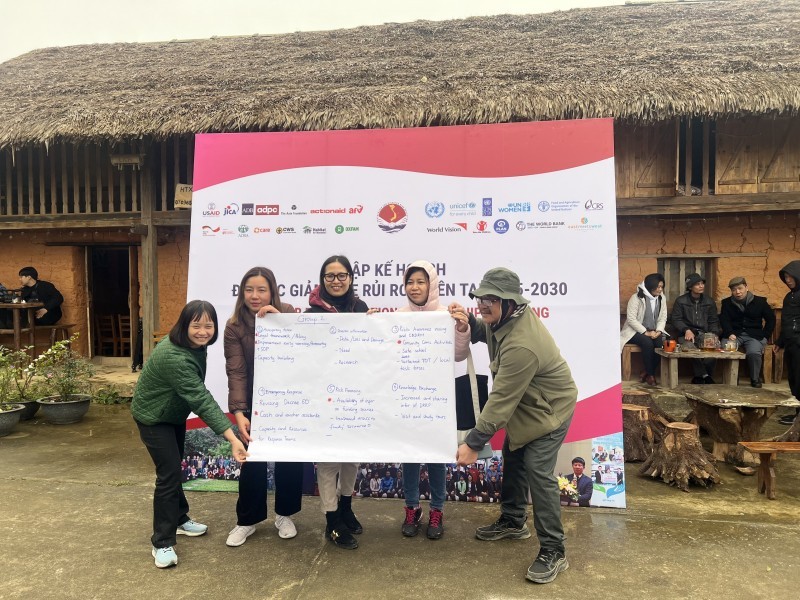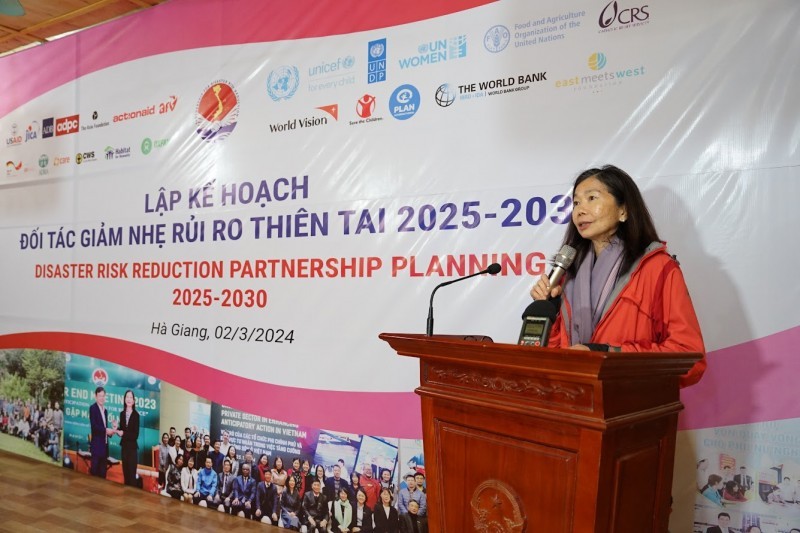A meeting was held on March 2 by the Vietnam Disaster and Dike Management Authority (VDDMA) under the Ministry of Agriculture and Rural Development to build a plan. The meeting was attended by representatives from disaster risk reduction partners such as UN Women, Action Aid, Japan International Cooperation Agency (JICA) Vietnam Office, and Plan International in Vietnam.
The meeting was attended by nearly 100 delegates from over 20 international and international non-governmental organizations, including JICA Vietnam, Plan International in Vietnam, UN Women, World Vision, and others.
During the meeting, participants discussed early actions, disaster information, public awareness enhancement, community-based disaster risk reduction, emergency response, knowledge exchange, and capacity building for disaster risk reduction partners. Disaster risk reduction partners.
 |
| Delegates presented proposals and comments on the development of the 2025-2030 Plan of the Natural Disaster Risk Reduction Partnership. Photo: Mai Anh |
The disaster risk reduction partnership’s plan for 2025-2030 will be developed in line with the priorities of the Government of Vietnam on natural disaster prevention and the strategic goals of all partners, said Pauline Tamesis, resident coordinator of the United Nations in Vietnam.
Tamesis added that the plan aims to enhance Vietnam’s resilience by focusing on areas such as coordinated policies, risk-inclusive development planning, and community awareness.
“The natural disaster risk reduction plan in Vietnam for the coming period will be community-based, with the implemented items being based on the needs of the people themselves. Early planning helps gather sufficient information and provide early warnings, enabling partners to be proactive in deploying and balancing appropriate budget sources,” said Tamesis.
Hoang Phuong Thao, representative of ActionAid International in Vietnam, stated that community-based natural disaster risk prevention and control programs have always been a priority for ActionAid during their 30 years of operation in Vietnam. They have implemented various programs, such as supporting crop and livestock livelihoods, building bridges, and installing energy-powered lighting systems, to prepare in advance, respond during, and recover after natural disasters.
Developing plans early helps create a favorable legal environment for the implementation of natural disaster risk reduction activities. It also promotes solidarity among members of the Natural Risk Reduction Partnership, where each member contributes to the overall success of the partnership’s initiatives in disaster risk reduction in Vietnam.
 |
| Pauline Tamesis, Resident Coordinator of the United Nations in Vietnam. Photo: Khanh Huy |
In his address at the event, Pham Doan Khanh of the VDDMA emphasized the importance of developing the plan to coordinate efforts in reducing natural disaster risks and enhancing Vietnam’s resilience.
Khanh stated that the plan should encourage the participation of all partnership members in disaster risk management activities, establish a unified forum to promote mutual support among members, and facilitate access to funding sources for disaster risk reduction initiatives. He also highlighted the need to create a favorable legal environment for the implementation of disaster risk reduction activities and ensure compliance with Vietnamese Government regulations.
Recognizing that each international organization has its own priorities, operational areas, and partners with different characteristics, Vu Xuan Thanh, VDDMA deputy head, expressed the hope of playing the role of connecting organizations, creating mechanisms and forums for close coordination among all parties, and making effective use of resources while avoiding overlaps.
Thanh affirmed that the Partnership Office will collaborate with the UN Office in Vietnam to summarize the discussion contents. A draft updated plan and more detailed consultations with Partner members and relevant parties will soon be completed and submitted to the partnership co-chair for approval.
The Disaster Risk Reduction Partnership (DRRP) was established under the Minister of Agriculture and Rural Development’s Decision No. 3922/QD-BNN-TCCB, with the participation of 20 international organizations and four ministries. The DRR members are responsible for developing, implementing, and monitoring national and global policies on natural disaster prevention and control, including intergovernmental, governmental, and non-governmental organizations, as well as financial institutions.
Vietnamese expert calls for enhancing community resilience to deal with natural disasters
In October 2020, according to the National General Statistics Office, central Vietnam was hit by four tropical storms with heavy rains and landslides that killed 129 people and damaged more than 111,200 houses. Even though the local people are no strangers to killer tropical storms, Nguyen Ngoc Huy, a Vietnamese international expert and senior advisor for Oxfam on climate change, believes more needs to be done in order to save lives and property after natural disasters.






